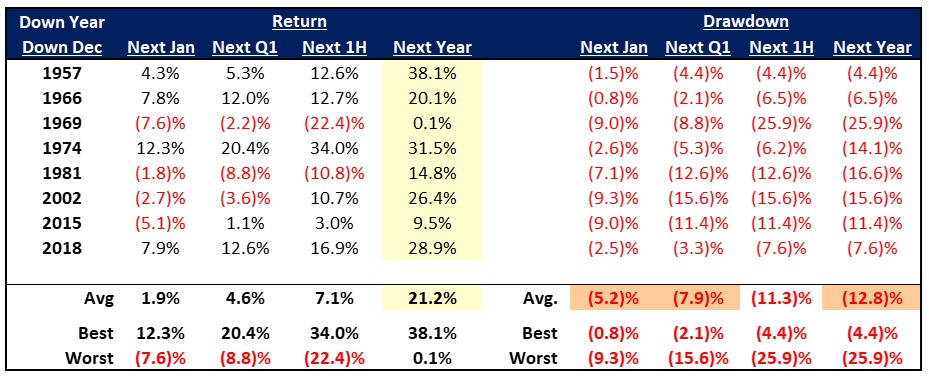
The stock market declined the first day of 2023, rekindling some of the bad memories of 2022. Despite the 2.5% bounce over the last two days of the year, the stock market fell 5.9% in December, which brought the S&P 500’s full year 2022 decline to 19.4%. It was a bad finish to a bad year. Since 1928, there have only been 6 years that were worse than 2022 for the stock market.
Yet, amid all the gloom, we believe there’s reason for optimism. Let’s take a look at the other bad years that finished on a bad note. Shown below are all years since WW-II where the S&P 500 lost 15% or more and also had a down December.

Source: Vineyard Global Advisors, data sourced through Bloomberg
What do you notice? The yellow highlights show that every single year that followed a down 15%+ year with a down December generated a positive return that averaged 21%! This is over twice the S&P 500’s long-term return of 10% per year. Of course, this doesn’t guarantee 2023 will be positive, but it shows that the level of pessimism that existed at the end of 2022 has created flush-outs in the past that set the stage for better returns the very next year. Our emotional state often tempts us to do exactly the wrong thing when it comes to successful investing.
One warning: Note the columns on the right side of the table above. To get that 21% average gain, you needed to be able to stomach some additional volatility. The average drawdown (a peak to trough decline) in the first quarter of the following year was 5.2% and almost 7.9% over the following first quarter. Looking out over the full year, the average drawdown was 12.8%.
The Takeaway: History suggests 2023 may be a better year for investors, but it’s likely to contain the kind of volatility that rekindles many of the bad memories of 2022, tempting some investors to react emotionally.
Some other Good News of a Bad Year: For Vineyard investors, the majority of our strategies had low to mid-single digit drawdowns due to our risk-managed philosophy. Because of that, they will have less of a hole to dig out of as the market recovers before getting back to making money. This compares favorably to the recovery needed to recoup from the 19% decline of the S&P 500 and 33% decline in the Nasdaq. The so-called FAANG+ stocks (Meta, Apple, Amazon, Netflix, Google, Microsoft, Nvidia and Tesla) lost 47% in 2022.
While the historic analogs and other considerations we’ll discuss in our year-end webinar suggest a better year ahead for investors in 2023, we’ll continue to follow our objective, weight-of-the evidence approach to confirm the state of the investment backdrop and adjust our strategies accordingly. These objective indicators caused us to adjust our strategies defensively at the beginning of 2022 as they warned of a deteriorating investment backdrop after remaining steadfastly bullish from just after the Covid crash low of 2020 through the end of 2021.
As always, we appreciate the confidence and trust you have placed in us to manage a portion of your wealth.
-VGA Investment Team
Vineyard Global Advisors offers a range of investment strategies designed to allow participation in the market's growth within a dynamic, risk-managed framework that seeks to protect against significant market declines. Our goal is to give our clients greater peace of mind by generating steadier returns over time. Contact us to learn more.
Investment advisory services are provided through Integrated Advisors Network, LLC (“Integrated”) a registered investment advisor. Registration does not imply a certain level of skill or training. Vineyard Global Advisors, LLC is a practice group of Integrated.
The opinions expressed herein are those of Vineyard Global Advisors and are subject to change without notice. This material is not financial advice or an offer to sell any product. Forward-looking statements cannot be guaranteed. This document may contain certain information that constitutes “forward-looking statements” which can be identified by the use of forward-looking terminology such as “may,” “expect,” “will,” “hope,” “forecast,” “intend,” “target,” “believe,” and/or comparable terminology. No assurance, representation, or warranty is made by any person that any of Vineyard’s assumptions, expectations, objectives, and/or goals will be achieved. Nothing contained in this document may be relied upon as a guarantee, promise, assurance, or representation as to the future. Vineyard Global Advisors is an investment adviser registered with the U.S. Securities and Exchange Commission. Registration does not imply a certain level of skill or training. Investment advisory services offered through Integrated Advisors Network, LLC (“Integrated), a registered investment advisor. Vineyard Global Advisors is a DBA of Integrated.
Investors cannot invest directly in an index.
There is no guarantee that the investment objectives will be achieved. Moreover, past performance is not a guarantee or indicator of future results. Does not constitute advice or a recommendation or offer to sell or a solicitation to deal in any security or financial product. It is provided for information purposes only and on the understanding that the recipient has sufficient knowledge and experience to be able to understand and make their own evaluation of the proposals and services described herein, any risks associated therewith and any related legal, tax, accounting or other material considerations.
Integrated is registered with the Securities and Exchange Commission (SEC). Registration of an investment adviser does not imply any specific level of skill or training and does not constitute an endorsement of the firm by the Commission. Business is only transacted in states in which it is property registered or is excluded or exempted from registration. A copy of Integrated's and VGA's current written disclosure brochure filed with the SEC which discusses among other things, business practices, services and fees, is available through the SEC's website at: www.adviserinfo.sec.gov
Vineyard Global Advisors, LLC (“the Adviser”, “Vineyard Global Advisors”, or “VGA”) is a DBA of Integrated Advisors Network, LLC (“Integrated”). Integrated is an SEC registered investment advisor. Registration does not imply a certain level of skill or training. VGA is affiliated with, but not under common control of, Integrated.
More information about Vineyard Global Advisor, including our investment strategies, fees and objectives, can be found in our Form ADV Part 2A and our Form CRS.
Copyright © 2026 | Vineyard Global Advisors LLC | All Rights Reserved.
Lorem ipsum dolor sit amet, consectetur adipiscing elit. Cras eu mauris dapibus ante interdum tempor non eu metus. Vestibulum ante ipsum primis in faucibus orci luctus et ultrices posuere cubilia curae; Sed lobortis sodales consequat.